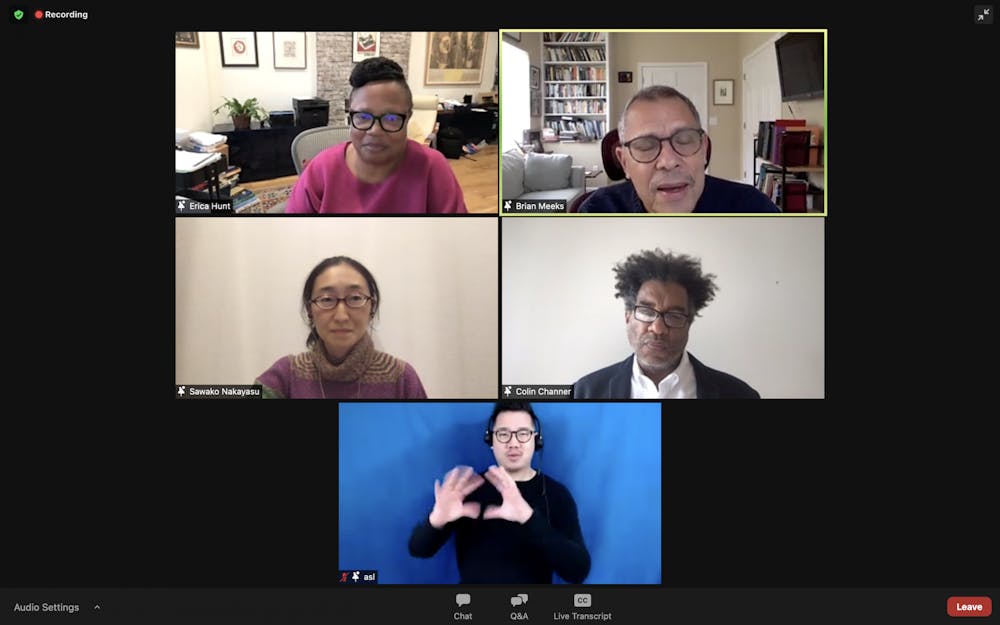A group of faculty members in the literary arts department discussed how poetry can be a means of processing oppression and struggle while also expressing racial identity and optimism at a “Race & Poetry” webinar held Tuesday.
“How do we suppose something that we don’t have yet, the absence of violence against Black bodies, Black women, trans bodies?” asked Erica Hunt, assistant professor of literary arts. “I for one have been writing poetry for 35 years, and I’ve been involved in struggle ... it’s what draws me back again and again to poetry.”
The webinar was part of the “Race &” webinar series, which facilitates discussion among Brown faculty about the intersection of racism and different intellectual disciplines. Colin Channer and Sawako Nakayasu, assistant professors of literary arts, joined Hunt in discussing their work through the lens of racial identity.
“Since the brutal killing of George Floyd and the blossoming of the Black Lives Matter movement in the summer of 2020, there’s been efflorescence of seminars, conversations, institutional initiatives, articles and books and inevitably poetry as an answer to the brutality of that moment,” said Professor of Africana Studies Brain Meeks, who moderated the event.
Channer kicked off the webinar by reading his poem “Spumante,” which describes a whale carcass he encountered on a Massachusetts beach, while also drawing deep metaphors of loneliness in the Black experience and engaging with the motif of water.
“It’s a blatant kind of metaphor … of self-exile,” he said of the poem. He added that he wanted to riff on images of drowning, which echo “a pseudoscience in times of slavery,” which was “the notion that Black bones were heavier, and so we’d sink.”
“It was a way of discouraging Black people from trying to escape across water,” Channer said. “Simply not drowning for me is a form of joy and resistance.”
Nakayasu described her relationship to racial identity, having moved from white, suburban America to Japan and China, where she lived for 15 years. “I feel there’s more space now for us to inhabit the poetic landscape without participating in an explicitly white-centric notion of poetry,” she said.
Nakayasu read “Mountain Girls” and “Girl Soup” from her book of poems “Some Girls Walk into the Country They are From.” In her reading of “Girl Soup,” she opted to replace the word “girl” with “Japanese,” which she said was meant to demonstrate how different identities contrast and draw similarities within that intersection.
Hunt read her poems “Upon another acquittal (a choreography of grief),” “Mourning Birds” and “Lines on Love’s (Loss*),” drawing upon themes of Black motherhood and resilience throughout history.
Hunt also showed a photograph of Black hair with rice braided into different sections and described how this custom originated during the slave trade so enslaved people would be able to grow food wherever they landed. “I think about the investment in the future there,” she said. Despite enslaved people being “kidnapped and brutalized,” they somehow saw “beyond the current bleakness the possibility of a future,” Hunt said.
During the question and answer section in the second half of the event, Hunt, Channer and Nakayasu discussed the capacity of poetry to capture experiences with race and racism and help people of color process their experiences, both with oppression and joy.
“I write to find out what I know, what I think and what I’ve experienced,” Hunt said. She also described how poetry can be a mechanism for breaking with norms. “I love poetry for itself, it moves me, and also poetry is a way of extending the usual boundaries of imagination,” she said. “We desperately need a different kind of imagination.”
Channer described how his background as a Jamaican immigrant allows him to start his poems with sound, some of which draw on the linguistic history of the Caribbean. “I have this inheritance that I can draw on ... (to create art) among and between languages and registers,” Channer said.
The panel also discussed the struggles of BIPOC authors and professors as they search for artistic freedom, pursue proper compensation and navigate racism at academic institutions.
Hunt said that she avoided academia for much of her career for these reasons but has found communities of poets to whom she can reach for support when needed. Nakayasu agreed, saying that her family has also been another large source of support. For Channer, his poetry in itself is a means of coping. Nakayasu said that writing and reading poetry can be a way of emotional processing, not just with matters of race.
“When I think about the capacity of poetry and Black poetry right now, I think that one of our responses to the present urgency is to hold the space,” Hunt said. “For the possible, and for the ‘not yet.’”

Katy Pickens was the managing editor of newsroom and vice president of The Brown Daily Herald's 133rd Editorial Board. She previously served as a Metro section editor covering College Hill, Fox Point and the Jewelry District, housing & campus footprint and activism, all while maintaining a passion for knitting tiny hats.





